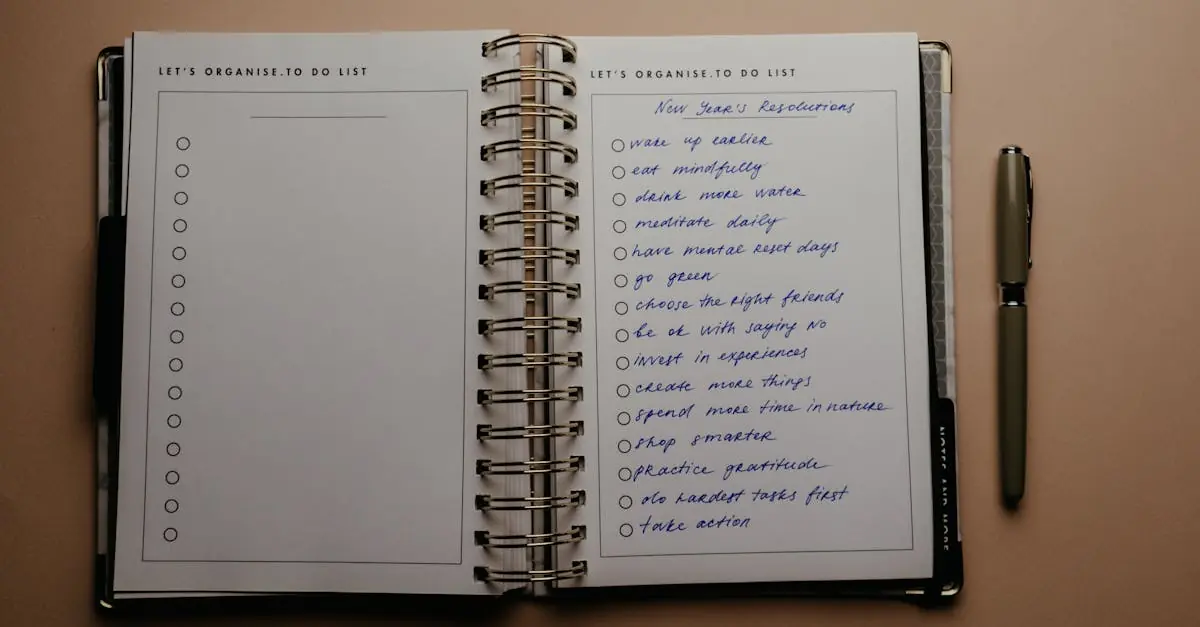In a world where distractions lurk around every corner like ninjas in the night, keeping track of habits can feel like herding cats. But fear not! Enter the habit tracker, your trusty sidekick in the quest for self-improvement. Whether it’s drinking more water or finally getting around to that yoga class, a habit tracker can turn your goals from mere wishes into tangible achievements.
Table of Contents
ToggleWhat Is a Habit Tracker?
A habit tracker is a tool that helps individuals monitor and record their habits over time. It provides a visual representation of progress, turning abstract goals into tangible results. Many people use habit trackers to cultivate positive behaviors, such as exercising regularly or practicing mindfulness.
This tracking method often involves daily or weekly check-ins, making it easier to recognize patterns in behavior. By highlighting successes and areas needing improvement, habit trackers promote accountability. Users can select from various formats, including physical notebooks, mobile apps, or spreadsheets.
Some popular examples of habit trackers include Todoist, Habitica, and Streaks. These apps offer features like reminders, achievements, and customizable layouts. Individuals may also choose a simple chart on paper that includes checkboxes for each habit.
Effectiveness stems from the visual feedback these trackers provide. Observing accumulated successes motivates continued effort and reinforces habit formation. Additionally, data analysis over time reveals consistency and trends, making it easier to adjust strategies.
Combining habit tracking with goal setting enhances its impact. Setting specific, measurable targets allows users to align their daily actions with long-term aspirations. This synergy transforms the tracking process into a powerful habit-forming tool, effectively paving the way for lasting change.
Benefits of Using a Habit Tracker
Habit trackers provide numerous benefits that support personal growth and self-discipline. These tools facilitate enhanced accountability and motivation among users.
Improved Accountability
An effective habit tracker places emphasis on accountability. Users can consistently track their progress, identifying days when they succeed or fall short. This visibility encourages owners to take responsibility for their actions as they check in regularly. Moreover, sharing progress with friends or family leads to a support system that reinforces commitment. Goals like drinking more water become more attainable through the daily act of recording, prompting individuals to stay on course. Regular reflections on successes and setbacks build a sense of ownership over one’s habits, driving further improvements.
Enhanced Motivation
Increased motivation emerges as a significant benefit of habit trackers. These tools provide clear visual feedback, allowing users to observe their progress over time. The satisfaction of marking off completed tasks fuels motivation, making individuals more likely to repeat positive behaviors. Users can celebrate small victories as they build streaks, transforming their efforts into a game-like experience. Different tracking formats, whether digital apps or physical planners, cater to personal preferences, making the tracking process engaging. Achieving milestones creates a sense of accomplishment. These feelings reinforce continued action toward long-term goals, making habit trackers powerful allies in personal development.
Types of Habit Trackers
Habit trackers come in various formats, each with unique features and benefits. Understanding the differences helps individuals choose the right tool for their goals.
Digital Habit Trackers
Digital habit trackers offer convenience and flexibility. Many people prefer mobile apps like Todoist, Habitica, and Streaks because these platforms provide alerts for reminders and can easily sync across devices. Users access their progress anytime, making it simpler to stay on track. Graphical representations, such as charts and graphs, illustrate trends over time. These trackers enable the incorporation of social sharing features, which can boost accountability. Numerous apps also allow users to customize layouts, adapting to personal preferences, fostering engagement.
Paper-Based Habit Trackers
Paper-based habit trackers present a tactile experience that digital formats lack. Many individuals appreciate the sensory aspect of writing down their habits in a notebook. This approach promotes mindfulness, making users more aware of their actions. Simple designs like bullet journals or printed templates offer structure while allowing personalization. Tracking with pen and paper can create a sense of commitment. Highlighting progress visually helps reinforce motivation. Additionally, reflecting on written entries encourages thoughtful consideration of habits, leading to deeper understanding and growth.
How to Choose the Right Habit Tracker
Selecting the right habit tracker involves considering several crucial factors that align with individual preferences and goals. Identify whether a digital or paper-based tracker suits your lifestyle better. Digital tools offer convenience and often include features like reminders and progress graphs, appealing to those who prefer technology. Meanwhile, paper-based options provide a more tactile experience, which can enhance mindfulness as users physically write down their habits.
Evaluate the specific features that different habit trackers provide. Look for customizable layouts that allow personalization. Some tools, like mobile apps, offer social sharing functions to enhance accountability. They provide platforms for sharing progress with friends, which can create supportive networks and reinforce commitment.
Examine the level of visual feedback a tracker offers. Graphical representations of progress can be highly motivating, encouraging consistent tracking of habits. The more engaging the visual feedback, the greater the likelihood of sustaining motivation and achieving goals.
Consider the ease of use. A habit tracker should fit seamlessly into your daily routine. Whether through quick mobile entries or simple checklists in a notebook, the best tool simplifies the tracking process.
Assess your goals and the habits you wish to cultivate. Choose a tracker that aligns with these aspirations. For example, someone aiming to increase physical activity may benefit from integrating a tracker that focuses on workout frequency and duration.
Finally, review user feedback or ratings before making a decision. Insights from others can inform about usability and effectiveness, helping to ensure the chosen tracker meets your needs effectively.
Tips for Effectively Using a Habit Tracker
Establish specific goals to guide the habit tracking process. Clear objectives serve as a roadmap, whether aiming to work out five times a week or read one book per month. Break larger goals into smaller, manageable steps. Smaller milestones make tracking progress easier and less daunting.
Select a consistent time for daily or weekly check-ins. Regular reviews help individuals stay accountable and identify trends in their behaviors. Use reminders to prompt tracking activities. Setting notifications on mobile apps or writing notes in a planner ensures no habit goes untracked.
Choose a format that resonates personally. Digital apps offer convenience, while paper journals provide a tactile experience. Experiment with different styles until finding the most enjoyable and effective option. Keep the tracker visually engaging. Adding color codes or stickers can make tracking feel less like a chore and more like a creative endeavor.
Celebrate achievements, no matter how small. Acknowledging progress fosters motivation and reinforces commitment. Share successes with friends or family to create a supportive network. Engaging others in this journey encourages accountability and shared experiences.
Adjust strategies as needed based on tracking results. If consistent issues arise, consider modifying habits or exploring new techniques. Flexibility ensures habit tracking remains effective over time. Review past data for insights. Understanding patterns in behaviors can highlight what works and what needs improvement.
Lastly, remain patient throughout the process. Developing lasting habits takes time and persistence. Celebrate the journey just as much as the destination.
Habit trackers serve as invaluable tools for anyone looking to enhance their personal development journey. By offering structure and accountability they empower individuals to take control of their habits and align daily actions with long-term goals. Whether opting for a digital app or a traditional notebook each format has unique advantages that cater to different preferences.
The visual feedback provided by habit trackers not only motivates users but also reinforces the commitment to positive change. Celebrating small wins along the way fosters a sense of accomplishment that fuels ongoing progress. With the right tracker and a dedicated approach anyone can harness the power of habit tracking to cultivate lasting habits and achieve their aspirations.








